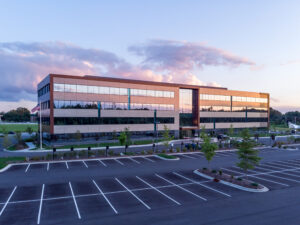Today, the news we all hear for commercial real estate and commercial property management is not great. The amount of commercial asset debt that is coming due in 2024-2026 is astounding. We hear that banks are not lending for commercial deals. What are commercial property owners and stakeholders going to do to combat this?
As we prepare for the forthcoming budget season of 2024, it is incumbent upon us to initiate discussions encompassing forward-thinking themes. Proactive decision-making for your commercial property asset has become an indispensable tool as we navigate towards the future. If your focus is exclusively fixated on evaluating the performance of your marketing dollars, you may find yourself, and your building vacancy, lagging. The indicators pointing towards the year 2024 mandate an “all hands-on deck” approach for marketing strategies to get your building occupied.

Within the ever-evolving landscape of commercial property management, the need to adapt and innovate has reached an unprecedented level of significance. With 2024 looming ahead, the commercial real estate sector is undergoing a profound shift. Established conventions are being scrutinized, paving the way for a new period in commercial property management. Embracing this metamorphosis is not merely an option; it is imperative for maintaining an edge in this ever morphing, dynamic industry.
Multifamily Market Realities – Things Are Different
The multifamily market, an indispensable cornerstone of the real estate sector, is facing challenges. CoStar has recently released some alarming trends—escalating capitalization rates and slow rent growth are reshaping property valuations across the nation. Within a span of 12 months, the average market cap rate has surged from 4.9% to 5.6%, culminating in a 13% decline in property values. This decline, coupled with rent growth slowing below 1% year-on-year, presents a disconcerting outlook for multifamily assets.
As commercial property management professionals, we are at a critical juncture. Strategic decision-making and innovative approaches have never been more important. Given these challenges, it is crucial for property managers to exercise discernment in their investments, considering the volatile market conditions and uncertainties in commercial lending.
The Evolution of Commercial Property Management: Anticipated Trends in 2024
Amidst the challenges described above, commercial property management is undergoing a rapid transformation. Several pivotal trends are reshaping the industry landscape, heralding a future characterized by sustainability, operational efficiency, and heightened user experiences.
Sustainability is a Real Buzzword
In response to mounting concerns about climate change, sustainability has taken center stage for property managers. Organizations, corporations, share holders are all embracing eco-friendly practices, emphasizing energy conservation, optimized waste management, and the integration of renewable energy sources. Certifications such as LEED and BREEAM have become standard guides, steering commercial property management teams towards pioneering sustainable practices, but the asset owner must also be on the same page with the marketplace to level up their products.

The Era of Smart Buildings
Smart buildings are now mainstream. Technology, in the form of sensors and devices, facilitates real-time monitoring and control of various aspects of buildings, augmenting efficiency and comfort. Digital interfaces have rendered conventional, in-person tasks obsolete, revolutionizing the management of building operations. If your building is not smart you might not be able to compete.
Predictive Maintenance: A Proactive Necessity
Data analysis and algorithms are spearheading a revolution in how commercial property managers approach equipment and systems maintenance. This proactive approach minimizes downtime, reduces costs, and extends the lifespan of critical assets. It also serves as a foundational pillar for sustainability endeavors, curbing unnecessary energy consumption. Once again, building owners need to be comfortable with this trend, need assurances that these systems are important upgrades, and must commit to getting their assets updated to compete in this marketplace. Commercial property managers should be in tune with these realities and be able to communicate this to their clients.
Remote Monitoring and Management
The aftermath of the COVID-19 pandemic has underscored the significance of remote monitoring technologies. Web-based platforms empower facilities teams to oversee building operations from any location, enhancing responsiveness and efficiency in addressing building conditions and tenant needs. Once more, building owners must find themselves at ease with this trend, seeking reassurances that these systems represent crucial upgrades, and must be prepared to invest in updating their assets to remain competitive in this marketplace. Commercial property managers need to effectively convey this message to be competitive.
Flexibility in Space Utilization and User Experience
Hybrid work models (developed during the pandemic) are reshaping the landscape of office spaces, necessitating adaptability and flexibility. Property managers are reevaluating the utilization of spaces to accommodate both remote and in-office workers. A focus on optimizing employee performance and building systems is paramount, ensuring a seamless balance between user experience and operational efficiency.

Initiatives for Health and Wellness
Post-pandemic, workplace health and wellness have gained prominence. Commercial property managers should be promoting the implementation of wellness programs that promote physical and mental well-being. Initiatives include fitness offerings, improved indoor air quality, and spaces designed to encourage physical activity, thereby enhancing tenant health, productivity, and job satisfaction. Building owners should be compliant with this trend as much as possible.
Robust Disaster Planning for Business Continuity
Given the escalating frequency of natural disasters, commercial property managers are prioritizing comprehensive disaster planning. Buildings are being designed to withstand extreme weather conditions, ensuring the continuity of business operations and the safety of tenants. Commercial property managers need to partner with building owners to ensure that disaster planning and safety are implemented in both budgeting and future building renovations to remain competitive in this marketplace.
Embracing the Future: Pioneering the Path in Commercial Property Management and Filling Up Your Parking Lot
Going forward into 2024, sustainability, technology, predictive maintenance, space flexibility, user experience, health and wellness initiatives, and disaster planning—will redefine the landscape of commercial property management. By embracing these shifts, property management professionals can spearhead the establishment of high-performing, sustainable, and healthy environments for all. Critical in this process is the ability for the commercial property manager to communicate the tantamount importance these concepts play in the long-term performance of the commercial real estate asset. It is not merely about adapting to change; it is about showing building owners the necessity for implementation, shaping the future of commercial property management by educating the commercial property owner – and helping everyone fill up the parking lot as soon as reasonably possible.
David currently is the broker/owner of several real estate related businesses which manage and maintain 300+ client properties on the San Francisco Peninsula.
Trust, transparency, and performance guarantees are the foundation of these businesses. David challenges anyone to find a PM professional that offers services similar - extensive education, customer service, and performance guarantees.
David also provides consulting for his clients on property development feasibility, construction, and complex real estate transactions.
David has authored a published law review article, three real estate books, and over 150+ real estate blog articles.
- “Wildfires, Insurance & Mortgages: Will Your Home Survive the Financial Aftermath?” - March 3, 2025
- What’s Driving California’s Commercial Real Estate Shakeup? - February 27, 2025
- Critical Issues in Triple Net Leases Investors Should Know - February 14, 2025

